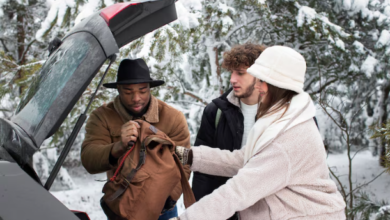What Is a Punk? How Vegas Weddings and Punk Spirit Share a Rebel Streak

Defining the Punk Ethos
When people talk about punk, they often jump straight to the music – the fast guitars, the shouted vocals, the general sense of chaos. But honestly, the music is just one piece of a much bigger puzzle. At its core, punk is really about a way of thinking, a mindset that says, “I don’t need permission to do this.” It’s about taking charge and making your own way, even if it’s messy.
The ‘Do It Yourself’ Spirit
This DIY attitude is probably the most important part of punk. It’s not just about picking up a guitar and learning three chords, though that’s part of it. It’s about realizing you don’t have to wait for someone else to tell you what’s cool or how things should be done. You can make your own zines, book your own shows, design your own flyers, or even just fix your own bike. It’s about self-reliance and not being afraid to try something, even if you’re not sure it’ll work out.
- Create your own art: Don’t wait for a gallery; put your stuff on the street.
- Start your own band: You don’t need to be a virtuoso; just have something to say.
- Publish your thoughts: Forget traditional media; make your own magazine.
This idea of making things happen yourself, without relying on established systems, is what really fuels the punk engine. It’s about empowerment through action, not waiting for approval.
Beyond Musical Classification
Trying to pin down punk to just one sound or genre is a losing game. Sure, there are bands that sound distinctly “punk,” but the spirit has spread way beyond that. You can find that DIY, anti-establishment vibe in all sorts of places, from art projects to political movements, and even in how people approach everyday life. It’s less about the specific notes and more about the intention behind them.
Attitude Over Genre
Ultimately, punk is an attitude. It’s about questioning authority, challenging norms, and not being afraid to be different. It’s about having a strong sense of self and expressing it, even if it makes some people uncomfortable. This rebellious streak, this refusal to just go along with the crowd, is what connects punk to other movements and ideas that also push boundaries.
Roots of the Punk Sound
It’s easy to point to The Ramones or The Sex Pistols and say, “Yep, that’s where punk started.” But honestly, that’s like saying Robert Johnson invented the blues. There’s a whole lot more history packed in there. Think about it – before those iconic bands hit the scene, there were already musicians messing with raw sounds and a defiant attitude. It’s like they were laying down the tracks, even if they didn’t know it at the time.
Garage Bands and Early Influences
Way back, even in the late 50s and 60s, you had bands that were just… loud. And raw. They weren’t trying to be polished or anything. Bands like The Wailers from Tacoma, Washington, were already making noise and showing a real attitude. Then you had groups like The Sonics from Seattle, who really set a tone for what punk would become. These were the garage bands – kids who thought, “Hey, I can do that,” and started bands in their parents’ garages. If they were decent, maybe a local record guy would put out a single. If they got lucky, it got some radio play. It’s the whole “That Thing You Do!” movie vibe, but real. A collection called “Nuggets,” put out in 1972, is a goldmine for this stuff. It’s packed with garage band music that basically became the blueprint for punk.
The Velvet Underground’s Impact
Then there’s The Velvet Underground. Active from the mid-60s to the early 70s, they weren’t exactly chart-toppers, but they were doing something different. John Cale’s electric cello playing? It was intentionally jarring, and that’s a big part of what punk is all about. You can hear their influence in so many bands that came later, from Pavement to Black Flag. They really showed that music didn’t have to be pretty to be powerful.
Proto-Punk Pioneers
Before the Ramones and the Pistols, there was a whole wave of bands pushing boundaries. Think about the MC5 from Michigan in the mid-60s, with their wild energy and loud sound. Or The Stooges, also from Michigan, in the late 60s, bringing pure mayhem. Later, in the 70s, you had bands like Rocket From The Tombs in Cleveland, making a racket that would eventually lead to bands like Pere Ubu and The Dead Boys. These groups were the warm-up act, the ones who showed that you could be loud, messy, and unapologetic. They were setting the stage for everything that followed.
Punk rock, at its core, is an attitude. It’s a “you don’t understand me, so I defy you” kind of thing. It’s about doing it yourself and being your own person, not just following the crowd. It’s a fine line between being unique and just being fake.
Here’s a look at some of those early influences:
- The Sonics: Known for their raw, energetic sound that predated much of the punk movement.
- The MC5: Brought a political edge and a wall of sound that was groundbreaking.
- The Stooges: Iggy Pop and company were masters of chaotic live performances and primal energy.
- The Velvet Underground: Their experimental approach and unconventional instrumentation paved the way for a more abrasive musical style.
It’s fascinating how these sounds and attitudes, often overlooked at the time, became the foundation for a whole genre. It really shows that music is always evolving, with each generation building on what came before, even if it’s just by reacting against it.
Punk’s Evolution and Key Figures
While many point to The Ramones and The Sex Pistols as the absolute originators of punk rock, it’s more accurate to say they amplified a sound and attitude that had been brewing for years. Think of it like this: they didn’t invent the spark, but they definitely fanned the flames into a wildfire. Before the leather jackets and snarling vocals took center stage, there were bands laying the groundwork, often in garages or small clubs, with a raw, unpolished energy.
The Ramones and The Sex Pistols
It’s easy to credit The Ramones and The Sex Pistols with kicking down the door for punk rock. The Ramones, with their stripped-down, fast-paced songs and matching leather jackets, brought a kind of minimalist, almost cartoonish energy to the scene. They were playing what they called “sick bubblegum music,” a far cry from the aggressive image many associate with punk today. Then came The Sex Pistols, who, whether by design or accident, became the poster children for punk’s rebellious spirit in the UK. Their notoriety, often fueled by media sensationalism, cemented punk’s image as something dangerous and anti-establishment. These two bands, in their own distinct ways, brought punk from the underground to a wider, albeit often shocked, audience.
Black Flag’s American Sound
Across the Atlantic, a different kind of punk was taking shape. Black Flag, emerging from Southern California, offered a more abrasive, intense, and often politically charged sound. Their music reflected a harsher reality, a raw frustration that resonated with a segment of American youth. This wasn’t the catchy, albeit fast, pop-punk of The Ramones or the UK’s shock-value punk; it was something heavier, more direct, and deeply rooted in a sense of societal discontent. Their DIY ethos was palpable, from their independent record label to their relentless touring schedule, often playing in less-than-ideal venues.
Political vs. Arty Punk
As punk grew, it naturally splintered into different factions, each with its own focus. On one hand, you had the overtly political bands, like The Clash, whose lyrics tackled social issues and political commentary head-on. They used their music as a platform for protest and change. On the other side, you had the more
The Rebel Streak: Punk and Vegas Weddings
It’s funny how things change, right? You think about punk, and you picture ripped jeans, loud music, and a general disregard for the rules. But then you look at something like a Vegas wedding, especially the quick, no-fuss kind you find at a classic candlelight wedding chapel in Las Vegas, and you start to see some parallels. Both are about breaking away from the expected, from the stuffy traditions that tell you how things should be done.
Unconventional Celebrations
Think about it. A punk show isn’t about polite applause and reserved seating. It’s raw energy, a shared experience that’s a bit messy and totally alive. Similarly, a Vegas wedding, particularly one that embraces the city’s unique vibe, isn’t about the formal sit-down dinner or the carefully curated playlist. It’s about making a statement, about doing something that feels authentic to the couple, even if it’s a little wild. It’s a rejection of the cookie-cutter wedding that’s become the norm for so many.
Embracing Spontaneity
Punk, at its core, was often about seizing the moment. The DIY ethos meant you didn’t wait for permission or a record deal; you just made your own music. Vegas weddings can capture that same spirit. You don’t need months of planning or a massive guest list. You can decide on a whim, grab a few friends, and tie the knot. It’s that impulsive, ‘let’s do this now’ energy that both punk and these quick Vegas ceremonies share. It’s about living in the now, not stressing over some distant future event.
Defying Expectations
Ultimately, both punk and a Vegas wedding can be about saying ‘no’ to what everyone else expects. For punks, it was about rejecting societal norms and commercialism. For couples choosing a Vegas wedding, it might be about rejecting the pressure to have a huge, expensive affair. It’s about saying, ‘This is our way, and we don’t need your approval.’ It’s a declaration of independence, a way to celebrate a union on your own terms. This idea of forging your own path, even if it looks a bit different, is a big part of what is a punk Las Vegas wedding is all about.
Punk’s Enduring Legacy
It’s funny how things that start out as a big middle finger to the establishment can end up becoming… well, part of the establishment. Punk, in its rawest form, was all about tearing down the old guard and doing things your own way. But like a lot of movements, it’s morphed and changed over the years. It’s not just about ripped jeans and loud guitars anymore, though that’s still a big part of it for many.
From Rebellion to Mainstream
Think about it. Bands that were once considered too noisy or too political are now studied in universities. Their music is on classic rock radio, and their fashion sense pops up in high-end boutiques. It’s a weird kind of evolution, right? What was once underground and defiant is now, in some ways, accepted, even celebrated. It’s like the ultimate punk move: take something they told you was bad and make it so popular that it becomes the new normal.
The Individualistic Drive
At its heart, though, punk always championed the individual. That whole “do it yourself” thing? It wasn’t just about making music; it was a way of looking at life. Don’t wait for permission, don’t follow the crowd, figure it out yourself. This spirit lives on, not just in music, but in how people approach all sorts of things, from starting a small business to planning a wedding that’s totally them.
What Is a Punk Las Vegas?
So, what does “punk” mean in a place like Las Vegas, especially when you think about weddings? It’s about ditching the stuffy traditions and embracing something more authentic, more exciting. It’s about saying, “Yeah, we could do the big, fancy wedding, but we’d rather do this.” It’s about that same rebellious energy that fueled early punk bands, applied to celebrating love in a way that feels true to the couple, not to some outdated rulebook. It’s about making your own rules, even if those rules involve Elvis impersonators and a quick trip to the chapel.
Frequently Asked Questions
What exactly is the ‘punk’ attitude?
Punk is more than just loud music with spiky hair. It’s about having your own ideas and not caring too much what others think. It’s about doing things yourself, being creative, and standing out from the crowd, even if it means being a little messy or different.
Where did punk music really start?
While bands like The Ramones and The Sex Pistols are famous, the punk sound has roots in earlier music. Think of garage bands from the 1960s that were raw and energetic, or bands like The Velvet Underground that experimented with noise and attitude.
Why did punk music become so popular?
Punk started as a reaction against the music and society of its time. It was about rebellion, questioning rules, and expressing frustration or excitement in a direct way. It wasn’t always about politics, but often about challenging the way things were.
Did all punk bands have the same message?
Punk has changed a lot over the years! Some punk bands focused on making political statements, while others were more about art and experimenting with sounds. Both types showed a desire to break free from the norm.
What does ‘do it yourself’ mean in punk?
The ‘do it yourself’ idea in punk means making your own music, art, or even planning your own unique wedding without relying on expensive or traditional ways. It’s about being original and creative.
How is punk connected to Vegas weddings?
Just like a punk wedding might be spontaneous and break traditions, the spirit of punk encourages people to be themselves, make bold choices, and celebrate life in their own way, rather than following what everyone else does.



